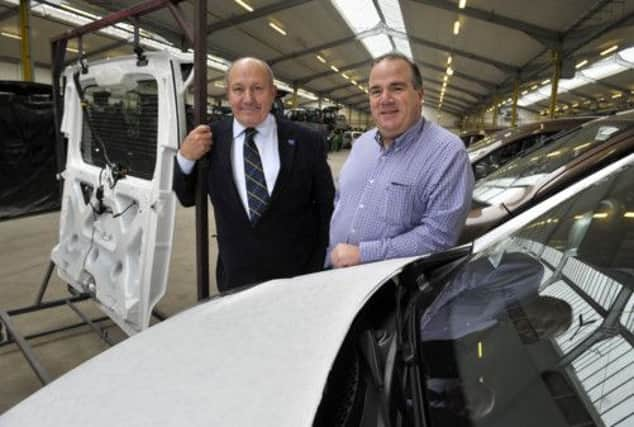Interview: Gerry Facenna, Allied Vehicles


His Glasgow-based company already accounts for a sizeable share of black taxis across most of the UK, and its specialist line of wheelchair accessible vehicles is on course to capture half of that market in the current financial year. Meanwhile, Allied’s Mobility Superstore has smashed all sales projections in its first four months of trading.
Ever in search of the next opportunity, Facenna and his brother Michael, who jointly serve as chairmen of Allied, have brought in Alex Roth to the newly created role of European sales manager. Roth, who took up the post last week, is charged with building up exports through an initial focus on adapted and special-purpose vehicles.
Advertisement
Hide AdAdvertisement
Hide AdGerry Facenna says there has been interest from abroad in Allied’s taxis for a number of years, though the company has never really pursued exports because of existing opportunities at home. Now it’s a different story.
“We see massive growth in the coming years both for our wheelchair accessible vehicles and traditional black taxis as well,” he says.
However, there remains one domestic battlefield that Facenna has failed to conquer despite numerous forays over the years: London.
Existing regulations require any vehicle used as a licensed London taxi to have a turning circle of no more than 25ft, leaving London Taxi Company’s TX4 to dominate the market. Allied’s taxis, made in Glasgow since 1997 on chassis supplied by Peugeot, do not meet this requirement.
Facenna argues that the regulations are outdated and unnecessary, but remain in place by virtue of “an old boys’ network – nothing more than that”.
He has campaigned over the years to have the regulation amended, including a legal challenge in 2002 that ultimately failed. He even appealed to then-prime minister Gordon Brown during an official visit to Allied’s sprawling Possilpark facility in early 2010, but that came to nothing.
The Allied boss has tried again, this time via Business Secretary Vince Cable. Little has come from that, though Facenna notes with a tinge of bitterness that Cable was on hand last month for the return of production at the Coventry factory lines of London Taxi Company – which is now owned by China’s Geely Group.
“We are a 100 per cent British-owned company manufacturing in the UK,” he says. “It really sticks in my throat that in the capital of my country, when people are flying in from abroad they can’t see my taxis when they look out the airplane window. So, with that in mind, I have fashioned a letter to David Cameron asking how businesses in Scotland can benefit from the Union.”
Advertisement
Hide AdAdvertisement
Hide AdIt is, he concedes, a political “hot potato”, but Facenna proclaims himself to be at the end of his tether. Having sent his missive to “the highest authority” last week, he once again waits to see whether there is a chance of cracking into the UK’s single largest taxi market.
Having previously taken Edinburgh and Liverpool city councils to court over similar issues, Facenna and his brother are seasoned fighters for the business they inherited in 1965, and were then forced to rebuild 25 years later.
Born and raised in Possilpark until the age of eight, Facenna then moved with his family to the village of Arrochar at the head of Loch Long. It was there that he had his first job, serving petrol in his father’s garage, and a year later at the age of 11 that he learned to drive on the surrounding countryside tracks. Even then he knew that he wanted to work with cars, but his father’s death at just 52 left the Facenna brothers in charge of the family’s sales and repair business far sooner than they might have expected.
Facenna left school and began training as a mechanic at the age of 15, allowing him and his older brother to return to their roots in Glasgow. Through the years they built up a string of dealerships and a network of leasing customers across the UK, and had 300 employees before the recession of 1989 took hold. Though they didn’t go bankrupt, the business was brought to its knees as invoices went unpaid. A rival trader took over the operations, leaving the Facennas wiped out.
They started again in 1990 with a loan of £80,000 from their sisters, employing six people selling and repairing taxis. From there, the brothers’ operations expanded into taxis adapted for wheelchair access, specialty vehicles for leasing and most recently, the Mobility Superstore offering scooters, wheelchairs and other equipment for independent living.
With sales more than double projections in the first four months of trading, Facenna is already looking to open a second store within the next six to nine months, most likely in Manchester or Liverpool.
Meanwhile, group revenues for the current financial year to April 2014 are on course to rise by some 10 per cent to more than £80 million.
Although profit margins remain tight, it is a far more optimistic picture than a couple of years ago, when Allied was forced to cut about 90 jobs during the depths of the latest recession. The company has since begun hiring again, with the current headcount at 433.
Advertisement
Hide AdAdvertisement
Hide AdThe experience of 1989 has left Facenna in no doubt about the importance of conserving cash during periods of economic turbulence.
“It’s not about profits – it’s about survival,” he says. “If you are losing money, then you have to put a stop to it, otherwise you will very quickly bleed to death.”